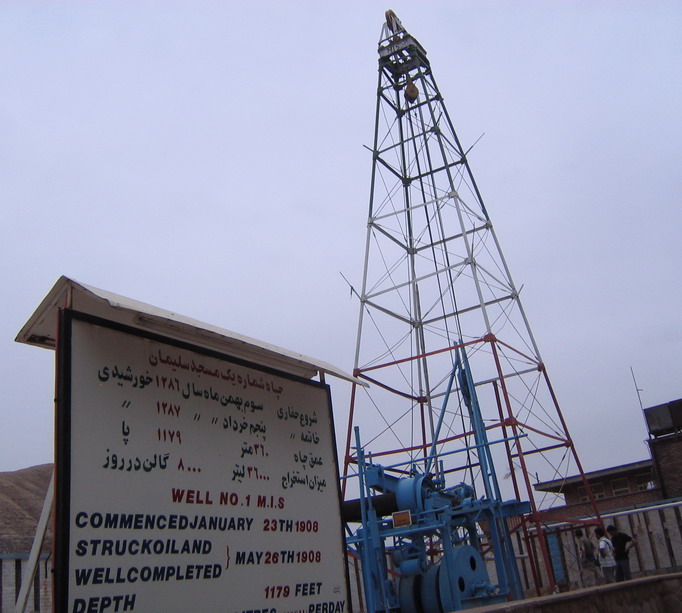 In 1901, the British financier William Knox D'Arcy secured the rights to "search for, obtain, exploit, develop, render suitable for trade, carry away and sell natural gas, petroleum, asphalt and ozokerite throughout the whole extent of the Persian Empire (Iran) for a term of 60 years" from the Persian ruler, Mozaffar al-Din Shah Qajar, in return for £20,000, shares in the venture and 16% of all future revenue. D'Arcy hired the son of a Vice-Admiral, George Reynolds, as field engineer, and he began by prospecting near the border with Ottoman-ruled Mesopotamia (Iraq). Reynolds began drilling late in 1902 but had to abandon his test wells two years later.
In 1901, the British financier William Knox D'Arcy secured the rights to "search for, obtain, exploit, develop, render suitable for trade, carry away and sell natural gas, petroleum, asphalt and ozokerite throughout the whole extent of the Persian Empire (Iran) for a term of 60 years" from the Persian ruler, Mozaffar al-Din Shah Qajar, in return for £20,000, shares in the venture and 16% of all future revenue. D'Arcy hired the son of a Vice-Admiral, George Reynolds, as field engineer, and he began by prospecting near the border with Ottoman-ruled Mesopotamia (Iraq). Reynolds began drilling late in 1902 but had to abandon his test wells two years later.
The enterprise was in financial difficulties and D'Arcy was forced to approach the Burmah Oil Company seeking investment in order to continue the expedition. D'Arcy accepted 170,000 shares in Burmah, in return for the rights to exploit Persian oil. Reynolds received instructions from his new bosses to start prospecting in south-west Persia where he spent two unproductive years before finally getting the chance to try the location he thought most likely to produce commercial wells: Masjed-e-Suleiman.
By this time Burmah was also suffering financially, as such its directors told Reynolds to abandon drilling if he didn't discover oil above a depth of 1500 feet. On 26th May 1908 - possibly in defiance of an order to cease operations and return home - Reynolds struck an enormous quantity of oil at a depth of 1180 feet. He had discovered the first of the great Middle-Eastern oil fields. The discovery enabled the foundation of the Anglo-Persian Oil Company (APOC) later that year as a subsidiary of Burmah Oil Company and forerunner of today's British Petroleum (BP). Volume production of oil started five years later following the construction of the Abadan Refinery. As prospectors found other massive deposits of oil in the region, the economic and strategic importance of the Middle-East was ensured, continuing to the present day
To learn more about the later history of the petroleum production in the region read Dr. Mohammed Malek's article 'Oil in Iran between the Two World Wars' on the Iran Chamber Society web site.
Related posts
First gasoline-driven automobile patented, 29th January 1886
Customised search for historical information
26 May 2009
On this day in history: Discovery of first commercial oil field in the Middle East, 1908
Subscribe to:
Post Comments (Atom)















3 comments:
It's vital to understand and delve into the History of Petroleum as then One can see how the Political Agenda that has taken shape because of it and Globalization Policies which have then come into fruition. Great post.
Very interesting info...
s&q: Indeed. Black gold they call it.
Thanks for all the comments.
Post a Comment